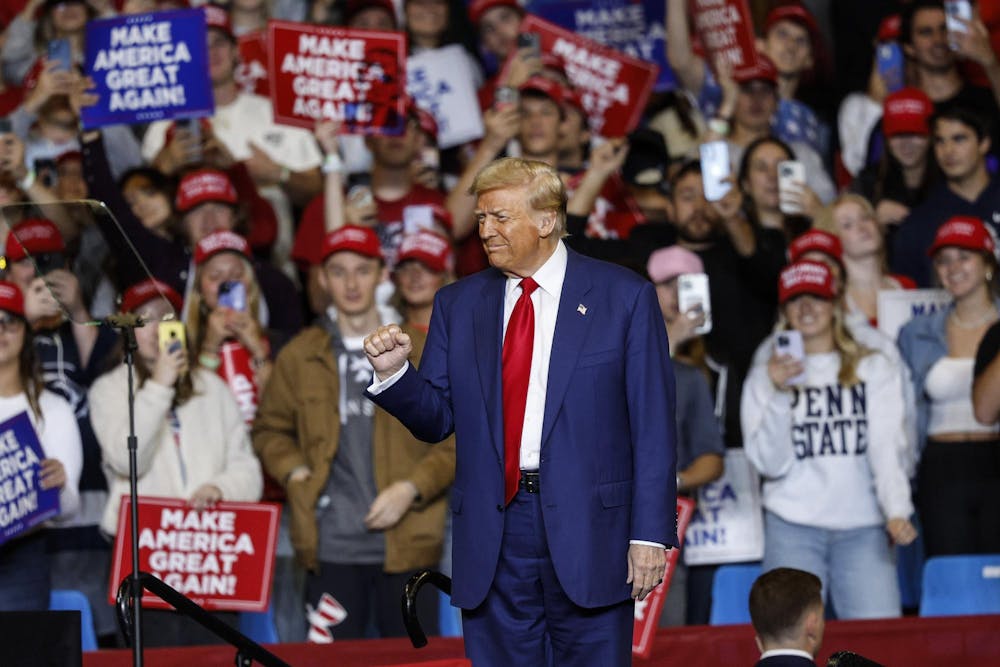Donald Trump won the presidential election by much more than most experts thought he would. The results were apparent the night of Election Day and called the morning after. Many expected it would take days to know.
The national results seeped into local and state politics. Trump won Indiana by 19%, improving the 16% margin he won by in 2020. That hurt state Democrats who had to deal with a much redder environment than they were hoping, and bolstered state Republicans via turnout.
Where the country lands as a society is still up in the air. But local politicos have some ideas about why the results shaped up the way they did.
IU political science professor Steven Webster said the results could be partly explained through the economy and the simple fact that most Americans feel poorly about it.
He said most people will recognize the economy’s health via their costlier grocery receipts, not the health of the stock market or figures regarding gross domestic product. That meant Democratic messaging highlighting positive numbers, Webster said, felt intangible.
“Donald Trump was able to in many ways appeal to voters’ frustrations over the rise in prices,” he said.
John Gregg, a former Democratic speaker of the Indiana House of Representatives, said in a later interview with the Indiana Daily Student that Democrats likely focused too little on economic issues in favor of social issues.
“I think the Democrats truly thought what was going to deliver it this time was women and abortion,” Gregg said. “And that turned out not to be the case.”
Gregg, who is also an adjunct professor at IU, said much of his own success as a Democrat in Indiana was due to focusing on these kitchen table issues and recognizing where people were hurting.
The U.S. economy is doing better than most of the world, by most indicators. Inflation trended lower and improved faster, unemployment recovered quicker and GDP growth has been solid.
However, perceptions of the economy have stayed negative among Americans. In NBC exit polls, about a third of voters rated the economy as “poor.” Trump won those voters by 77%. Among the 35% of voters who said the economy was “not so good,” Trump won by 10%.
Gregg said Democrats simply weren’t able to reach the people hurt by higher prices. Harris’ “opportunity economy” just didn’t stick. Trump’s messaging felt the working class’s pain, Gregg said — and results show gains across the board with that demographic.
Campaign blues
It’s important to note most local politicos have said it wasn’t Harris’ fault she lost. Inflation hurt incumbent parties worldwide, including in elections in Botswana, India, South Africa and the United Kingdom.
“You can look back and say, ‘would have, could have, should have,’” Gregg said. “But I think she was, in the circumstances, a very good candidate.”
Paul Helmke, former Republican mayor of Fort Wayne and current IU professor, said Biden should have dropped out much, much sooner. And he said the process for the party’s nomination should have been open, rather than handpicked. If she was competing with other Democrats, she would have gained more headlines and more recognition.
“People would have a sense of who she was, what they liked or didn't like about her,” Helmke said.
Because she ran a campaign of only a few months against a man who has been in the political zeitgeist for nearly a decade, he said, it was much easier for Republicans to paint her however they wanted to.
Also impacting the outcome was the fact that not as many people voted for Harris as they did for President Joe Biden in 2020. Total votes are not yet tabulated, but her turnout bled across the board from Biden’s numbers.
Webster said he was unsure about the Harris campaign’s emphasis on luring over Republican voters.
“The decision to campaign with Liz Cheney as much as she did and trying to win over Republican voters was probably not the best use of her time,” he said.
That hurt her efforts to turn out the Democratic base, Webster said. Combined with Biden’s unpopular incumbency, he said, turnout for Harris suffered.
He said Republicans were able to successfully message to working class voters and people of color who were frustrated with the incumbent government. Especially on economic issues, the party's strategy worked.
That manifested in rightward swings across the country, especially in working-class areas that bore the brunt of inflation. Lake County, bordering Chicago, shifted 9.4% more Republican. Industry-heavy areas across the state swung right too. Most other counties in Indiana shifted right, apart from the wealthier suburbs of Indianapolis. Those swung left.
That followed a trend nationwide. Virtually every other demographic but white voters with college degrees swung right. Rural counties continued their dash rightward.
That impacts state elections in Indiana especially. When state Democrats can’t crack more than 25% of the vote in most of Indiana’s counties, Gregg said, winning becomes near impossible. He said focusing on progressive social issues puts Democrats in a quagmire while talking other policy.
“You're not going to care about LGBTQ issues if you can't put food on the table,” Gregg said. “I mean, it's just a fact, and I'm not saying those aren't important issues I support.”
As Democrats increasingly shift to becoming the party of white college-educated voters, Gregg is concerned where that will place the party. Warning signs are already here, he said, seen in shifts rightward among Latino, Black, young and working-class voters.
That national wave brought Indiana three points redder and helped sink the state Democrat’s surprisingly contentious campaigns for attorney general and governor. Gregg would know about that sort of environment — he lost by 6% in the Governor’s race in 2016, as Trump swept Indiana by 19%.
Gregg still feels McCormick should have run less on social issues, but said the national environment would have sunk her campaign regardless. She lost by 13%.




